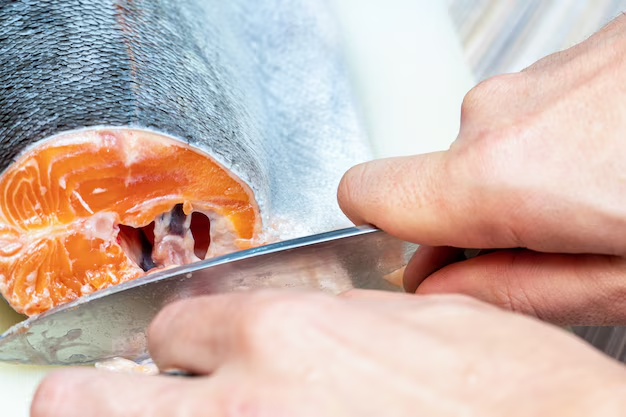How Long Can You Keep Cooked Fish in the Refrigerator?
There's nothing quite like a delicious fish dinner, whether it's a savory salmon fillet or a tender piece of cod. However, as we enjoy these meals, an often overlooked but crucial question arises: Just how long can cooked fish safely remain in the refrigerator? Understanding this can help prevent food waste and ensure your meals are safe to eat. Let’s dive into this topic with the right mix of practical advice, expert insights, and user-friendly tips.
🐟 The Basics of Storing Cooked Fish
When it comes to storing cooked fish, understanding the core principles of food preservation is essential. Cooked fish is, generally, a perishable item that requires careful handling and proper storage conditions to maintain its quality and safety.
- Refrigeration Time: On average, cooked fish can last in the refrigerator for about 3 to 4 days. This timeframe ensures that the fish remains safe to eat and retains its flavor.
- Refrigerator Temperature: To maximize freshness, your refrigerator should be set no higher than 40°F (approximately 4°C). This inhibits bacterial growth and delays spoilage.
- Storage Containers: Use airtight containers or heavy-duty aluminum foil to keep fish from absorbing the odors of other foods in the fridge and to prevent contamination.
Understanding Fish Spoilage
Spoilage is a natural process, but it can be managed through proper storage. Recognizing the signs of fish spoilage is crucial to ensure food safety.
Signs of Spoilage
- Odor: Fresh fish and properly stored cooked fish should not have an unpleasant or "fishy" smell. An off-putting odor is a primary indicator of spoilage.
- Texture: Slimy or mushy textures in cooked fish can indicate bacterial growth.
- Color: Discoloration, such as browning or dullness, suggests that the fish should not be consumed.
Factors Affecting Shelf Life
Several factors can influence how long cooked fish lasts in the refrigerator:
- Type of Fish: Oily fish like salmon may spoil faster than lean fish like cod due to the higher fat content.
- Initial Freshness: Freshness at the time of cooking impacts how well fish will hold up in the refrigerator. The fresher the fish at the start, the longer it will last.
- Cooking Method: The way fish is prepared (e.g., grilled, baked, poached) doesn't drastically impact shelf life, but added ingredients (such as sauces) can affect it.
🥶 Freezing Cooked Fish for Longevity
For those instances where you might not consume cooked fish within 3 to 4 days, freezing is an excellent option to extend its shelf life considerably.
Proper Freezing Techniques
- Quick Cooling: Cool the fish quickly by placing it on a rack or in shallow containers before freezing.
- Airtight Packaging: Wrap the fish tightly with heavy-duty aluminum foil or place it in airtight freezer bags to prevent freezer burn.
- Labeling: Always label your packages with the freezing date. This will help you keep track of its storage duration.
Duration in the Freezer
When stored properly in the freezer, cooked fish can last for up to 2 to 3 months without significant loss of quality.
🧊 Thawing and Reheating Cooked Fish
Once you're ready to enjoy your preserved fish, how you thaw and reheat it is just as important as how you stored it.
Safe Thawing Practices
- Refrigerator: The safest way to thaw frozen fish is in the fridge, which keeps it at a safe temperature as it defrosts.
- Cold Water: For faster thawing, submerge the fish in a sealed plastic bag in cold water, changing the water every 30 minutes.
- Avoid Countertop Thawing: Thawing fish on the counter can lead to unsafe temperatures that encourage bacterial growth.
Proper Reheating
- Oven or Stovetop: Reheat cooked fish either in the oven or on the stovetop to ensure even heating without drying out.
- Internal Temperature: Ensure that the fish's internal temperature reaches 165°F (about 74°C) for safe consumption.
Embracing Sustainable Practices with Cooked Fish
Reducing food waste is a key component of sustainable living. By understanding how to properly store, freeze, and reuse cooked fish, we can contribute positively to the environment.
Creative Leftover Ideas
Transform leftover fish into:
- Fish Tacos: Shred the fish and pair with slaw, avocado, and salsa.
- Salads: Flake the fish over a leafy green salad for a protein-rich meal.
- Fish Cakes: Mix with breadcrumbs, eggs, and seasonings, then pan-fry to create delicious fish patties.
📝 Quick-Reference Guide: Cooked Fish Storage
Here’s a handy quick-reference guide for managing the storage life of your cooked fish:
| Condition | How to Handle | Duration |
|---|---|---|
| Refrigeration | Store in airtight containers at or below 40°F | 3-4 days |
| Freezing | Wrap tightly in aluminum foil or freezer bags | 2-3 months |
| Thawing | In refrigerator or cold water (not countertop) | Best within 24 hours |
| Reheating | Use oven or stovetop to 165°F | Immediate consumption |
✨ Tips for Sustainability:
- Meal Prepping: Plan your meals to reduce leftovers.
- Flavors: Use fresh herbs and citrus to enhance flavors post-thawing.
- Compost: Fish scraps can be a rich nutrient source for composting!
Wrapping It Up
Understanding how long cooked fish lasts in the refrigerator is about balancing safety, quality, and sustainability. By diligently following proper storage and handling techniques, you can make the most out of your meals while contributing to environmental efforts by minimizing waste. Remember, when in doubt about the freshness of your fish, it’s safer to err on the side of caution and refrain from consuming potentially spoiled food. Enjoy your fish, knowing you've mastered the art of proper storage!

